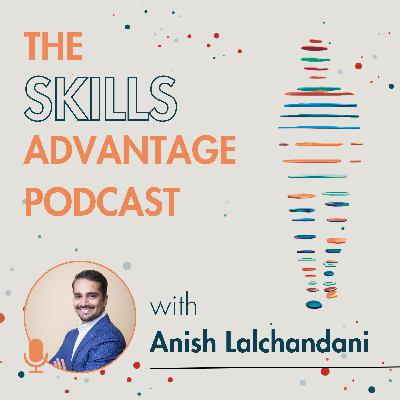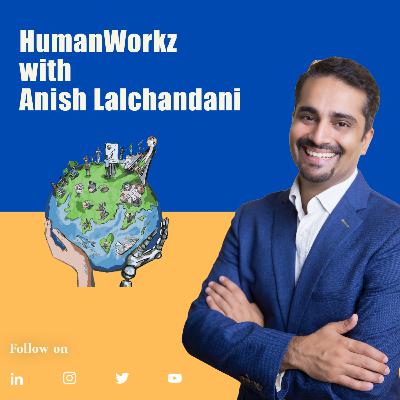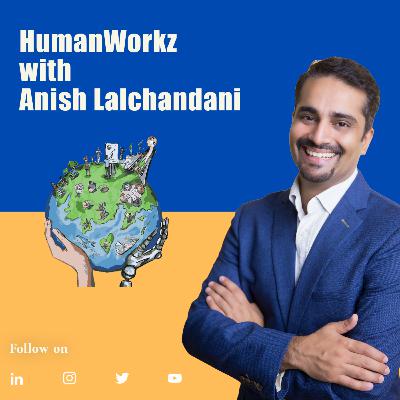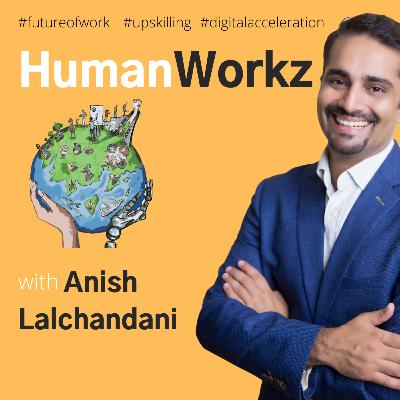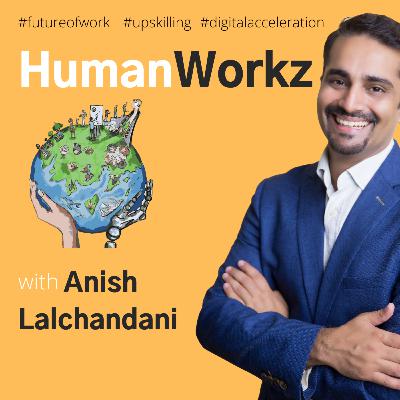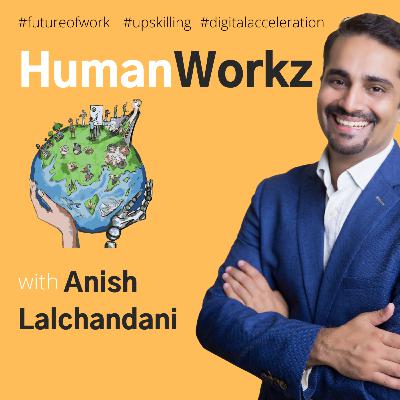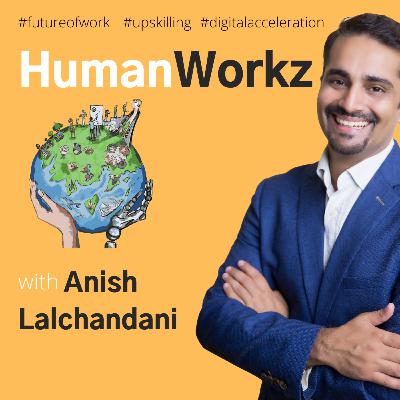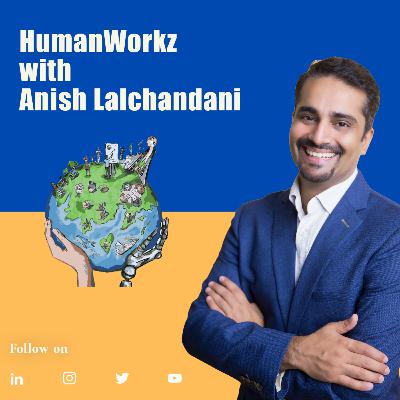Discover The Skills Advantage with Anish Lalchandani
The Skills Advantage with Anish Lalchandani

The Skills Advantage with Anish Lalchandani
Author: Anish Lalchandani
Subscribed: 0Played: 0Subscribe
Share
© Anish Lalchandani
Description
"The Skills Advantage" podcast, hosted by Anish Lalchandani, an internationally recognized HR leader and author, offers profound insights based on his book. Each episode dives into the importance of reskilling and upskilling in today’s rapidly evolving workplace. As automation and artificial intelligence reshape our environment, Anish uses his extensive experience to provide strategic advice and practical applications. The podcast addresses the pressing challenges and emerging opportunities these technological advances bring, equipping listeners with the necessary knowledge and tools to thrive
27 Episodes
Reverse
Welcome to the first episode of "The Skills Advantage" podcast, where we explore the transformative power of reskilling and upskilling in today's rapidly evolving workplace. Hosted by Anish Lalchandani, an internationally recognized HR leader, author, and thought leader, this series promises to be a beacon for all who navigate the intersection of jobs, skills, and artificial intelligence.
In this episode, Anish introduces the core themes of his book, "The Skills Advantage," providing listeners with a sneak peek into the insights and strategies that can empower organizations and individuals to thrive in the face of technological advancements and changing business models. As we dive into the urgent necessity of reskilling, Anish shares his motivation behind the podcast and the book, highlighting the excitement for the conversations, ideas, and transformations they aim to inspire.
Key Points Discussed:
The impact of artificial intelligence and automation on the workforce and industries.
The importance of adopting a human-centered, scalable approach to reskilling and upskilling.
An overview of what listeners can expect from future episodes, including deep dives into practical applications, fostering agility, and the significance of building alliances in a reskilling strategy.
Resources:
Take the Skills Advantage Quiz: Take Quiz
Join our newsletter for updates: Subscribe
Purchase "The Skills Advantage" on Amazon: Buy Now
About the Host:
Anish Lalchandani, author of "The Skills Advantage," is a seasoned leader with experience at top firms like A.P. Moller Maersk, General Electric, and Standard Chartered Bank. A Chartered Fellow of the CIPD and a certified professional coach, Anish is recognized as a top influencer in HR and the Future of Work by prominent publications. Follow Anish on LinkedIn: Connect on LinkedIn or visit his website to reach out: Contact Anish.
This a bonus episode where Anish shares about his upcoming book and a few updates on the conference he spoke about recently.
One request he has for you to participate in The Skills Project; here is the link for that.
https://www.anishlalchandani.com/theskillsproject
Please respond by this week and share with other colleagues.
Humanworkz Podcast is rated
as the Top 50 Leadership Podcast to listen to.
#thfutureofwork #upskilling #digitalacceleration
About the Host
Anish Lalchandani is a Global
thought leader (Top 25 thought leader on HR & Future of Work and Top 100
Leadership voices to follow) and speaker on the future of work, upskilling and
human capital.
Follow Anish on LinkedIn | Twitter | Instagram | YouTube | anish.lalchandani.com
Summary:
What are the best ways to involve employees in designing the future of work practices? How have onboarding and other HR practices changed? How to attract and retain employees? How should we approach upskilling?
My interview with Armaan focused on learning what the future of work means for Syngenta. A company focused on improving global food security by enabling millions of farmers across the globe. We discussed his experiences around Covid and how he managed his mental well-being and resilience as he transitioned jobs and countries. Arman also shared how they involved employees in sharing their feedback and adopted an agile and iterative approach to experiment and constantly learn from it. We also touched upon how that has fostered collaboration and innovation and supported this culture shift in a very diverse organisation.
Guest Profile:
Armaan leads the Global HR function for Syngenta Crop Protection based in Switzerland. He is a seasoned executive and coach who has worked across different industries and is keenly interested in Talent Management, the Future of Work and Mental well-being. Armaan has lived and worked across various countries in Europe, and the Asia Pacific and has been recognized as one of the Top CHROs in 2022.
You can reach Armaan on LinkedInand Twitter
You will also enjoy listening to the following:
S26: Diana Wu David: The Future of Work is built on Trust
S1E7: Lynn Dang: Building Equitable and Inclusive Experiences
Humanworkz Podcast is rated as the Top 50 Leadership Podcast to listen to.
#thfutureofwork #upskilling #digitalacceleration
About the Host
Anish Lalchandani is a Global thought leader (Top 25 thought leader on HR & Future of Work and Top 100 Leadership voices to follow) and speaker on the future of work, upskilling and human capital.
Follow Anish on LinkedIn | Twitter | Instagram | YouTube | anish.lalchandani.com
If you have any feedback, ideas or recommendations for a guest. Please write to: anish.lalchandani@gmail.com
S2E5: Ani Fhilipova: The Future of Careers
Summary:
We are stepping into the reality of a 100-year life. How will careers look in the future? How can we make conscious choices to balance personal and professional needs? What skills and support are required for a portfolio career?
My interview with Ani focused on her experiences pivoting into a portfolio career after a high-flying banking career. What was her motivation? What will the future of careers look like? She shared her experiences about experimenting and learning on the go and how critical it is to build a network of mentors and coaches. We also touched upon the future of banking and where it is headed, and what skills will be required to navigate the future.
Guest Profile:
Ani Filipova the Former Regional Regional COO for Citibank Treasury and Trade Solutions in Asia and Trade Solutions in Asia and now thriving in her portfolio career. She is now a board director, lecturer, speaker and investor. She is the founder of Change Advisory to help financial institutions formulate and implement strategies for digitalization, ESG, and transformation of the corporate culture.
She is representing is representing the the University of Northern Illinois (NIU) and is bringing American Executive MBA to Eastern Europe. She is also and is bringing American Executive MBA to Eastern Europe She is also member of the NIU MBA Baord of Executive Advisors. She is the host of the Change is possible podcast, discussing career pivots , discussing career pivots and can be reached on her personal website or on LinkedIn.
You will also enjoy listening to:
S2E2: Eris Sim: Rise of the Creator Economy
S1E1: Abhijit Bhaduri: Rise of intangibles – Leadership, Talent & Culture
Humanworkz Podcast is now rated as the Top 50 Leadership Podcast to listen to.
#thfutureofwork #upskilling #digitalacceleration
About the Host
Anish Lalchandani is a Global thought leader (Top 50 thought leader on HR & Future of Work) and speaker on the future of work, upskilling and human capital.
Follow Anish on LinkedIn | Twitter | Instagram | YouTube | anish.lalchandani.com
If you have any feedback, ideas and recommendations for a guest. Please write to: anish.lalchandani@gmail.com
My interview with Leadershum team on How can leaders navigate through crisis.
Please share you feedback about the Humanworkz Podcast to make it better, Thanks.
About the Host
Anish Lalchandani is a Global thought leader (Top 50 thought leader on HR & Future of Work) and speaker on the future of work, upskilling and human capital.
Follow Anish on LinkedIn | Twitter | Instagram | YouTube | anish.lalchandani.com
If you have any feedback, ideas and recommendations for a guest. Please write to: anish.lalchandani@gmail.com
Summary:
To many people, the Metaverse is still an abstract idea. When thinking about Metaverse, they often link with Meta (Facebook) or online gaming platforms like Roblox.
Believe it or not, Metaverse is building a trillion-dollar market with its application in various industries. In this episode, I speak to Dr. Mark van Rijmenam- a future tech strategist and author of the book “Step into the Metaverse” which will give us a brief view of the Open Metaverse. We will also discuss Metaverse risk and opportunity, how it changes the future of work, and what people can do to prepare for this drastic change.
Guest Profile:
Dr. Mark van Rijmenam is The Digital Speaker. He is a future tech strategist who thinks about how emerging technologies change organizations, society and the metaverse. Van Rijmenam is an international keynote speaker, 4x author and entrepreneur.
Check out Mark’s book:
Step into the Metaverse: https://amzn.to/2ZtC9S3
The Organisation of Tomorrow: https://amzn.to/31mL436
Blockchain: https://amzn.to/2D8fcb8
Think Bigger: https://amzn.to/2Fq6vGW
Website: https://TheDigitalSpeaker.com
You will also enjoy listening to:
S1E8. Andy Spence: Re-thinking Work for Economic Inclusion
S1E9:Anneli Rautiainen: Developing Tomorrow’s Futuremakers
About the Host
Anish is a Global thought leader and speaker on the future of work, upskilling and human capital.
Follow Anish on LinkedIn | Twitter | Instagram | YouTube | anish.lalchandani.com
If you have any feedback, ideas and recommendations for a guest. Please write to: anish.lalchandani@gmail.com
Summary:
What does humanizing work and workplaces look like? Why do we need to focus on ‘worth’? I sit down with Anna Tavis to explore her latest book, ‘Humans at work’ and discuss various topics such as upskilling, coaching, and the metaverse.
The workforce behavior is changing drastically. Their expectation from organisations are changing. Have you ever imagined how much metaverse, AI, and data analytics can affect an organization? And how we can prepare to adopt this change? Anna has a refreshing take on these big questions and shares insights from her research and experiences.
Guest Profile:
Dr. Anna Tavis is a Clinical Professor and Academic Director of the Human Capital Management Department at NYU School of Professional Studies, Senior Fellow with the Conference Board,and the Academic in Residence with Executive Networks. Dr. Tavis has been named to Thinkers50 Radar for 2020 and recently published the book ‘Humans at Work’. Dr. Tavis is a frequent presenter at international conferences on the Future of Work, People Analytics and Technology, Employee Experience and Intelligent Automation in the Workplace.Prior to joining NYU faculty, Dr. Tavis navigated a diverse global career in academia, business and consulting. Dr. Tavis received her PhD in Comparative Literature from Princeton University and Executive MBA in International Business from the University of South Carolina.
Check out Anna’s book Humans at Work and follow her on Linkedin
You will also enjoy listening to:
S1E8. Andy Spence: Re-thinking Work for Economic Inclusion
S1E7. Lynn Dang: Building Equitable and Inclusive Experiences
About the Host
Anish Lalchandani is a Global thought leader and speaker on the future of work, upskilling and human capital. He has been named top 10 Thought Leaders by Thinkers360. He has 20+years of experience in HR, Talent, Leadership and Culture in various industries.
Follow Anish on LinkedIn | Twitter | Instagram | YouTube | anish.lalchandani.com
If you have any feedback, ideas and recommendations for a guest. Please write to: anish.lalchandani@gmail.com
Season 2 Introduction
Podcast overview
The world of work is evolving; it’s scary for some and exciting for others.
While unemployment is on the rise, and jobs are being displaced by automation, new jobs are being created at the same time. We discuss the future of work, reskilling and digital acceleration with diverse leaders from Business, HR, Tech, Academia and others.
I am going to get curious to bring you the most interesting and meaningful conversations. We discuss building innovative, inclusive, and resilient organizations and making the work more human. We aim to inspire people to learn, grow, and thrive in this dynamic future of work.
This introduction covers 2 key updates :
1. What season 2 is all about
2. My personal updates
About the Host
Anish Lalchandani is a Global thought leader and speaker on the future of work, upskilling and human capital. He has been named top 10 Thought Leaders by Thinkers360. He has 20+years of experience in HR, Talent, Leadership and Culture in various industries.
Follow Anish on LinkedIn | Twitter | Instagram | YouTube | anish.lalchandani.com
If you have any feedback, ideas or recommendations for a guest. Please write to: anish.lalchandani@gmail.com
Reimagining Company Culture Podcast with Anish Lalchandani
About the episode
In this episode of Reimagining Company Culture, we’re chatting with Anish Lalchandani, Former Global Head of Talent Management at Standard Chartered Bank. Anish advises and consults with CEOs and HR leaders in sustainable building Talent & Diversity strategy to support their business growth and ambition. His work involves coaching senior business leaders and making work more human for today and tomorrow.
Connect with Anish on LinkedIn | Twitter | Instagram | YouTube
If you have any feedback, sponsorship ideas and recommendations for a guest. Please write to: anish.lalchandani@gmail.com
Guest Profile:
Anneli Rautiainen works as a councilor and Head of Innovation at the Finnish National Agency for Education. The Innovation Centre is part of a larger transformation effort towards more nimble governance at the national and local level – with the goal of being able to provide better services through experimenting and innovating. Anneli has graduated from Helsinki University with Masters in Education. Prior to this position at the Innovation Centre since 2017, she has been developing Finnish education as a teacher and a principal, in addition as a head of General Education, ECEC and professional development of education personnel at the government level. Anneli has been a keynote speaker and panellist in over 25 countries and five continents at various international conventions. She has been a member of international education networks; ISC, GELP, NPDL, ITE, ARC, OECD Education2030 Working Group and a member of OECD High Performing Systems for Tomorrow, HPST -group.
Episode summary:
In this conversation, Anneli and I discuss the future of education and the story behind the innovative approaches adopted by the Finnish education system. The focus on 21st-century skills and phenomenon-based learning is core to it to nurture and develop tomorrow’s future makers. We also cover impact due to COVID, flexibility teachers have to focus on personalised learning and guidance to new teachers.
Key questions and topics covered:
1. Finland is rated as one of the top countries in education. Please can you share the context behind that and what makes Finland so unique?
2. You were involved in the co-creation of the Basic Education National Curriculum; please can you share your key insights from that?
3. Do you see enough focus on the application of knowledge in the current education system?
4. What is your view on Phenomenal based learning?
5. How has COVID impacted the schools, teachers and students?
6. What has been the biggest learning you had from COVID?
7. The future is so dynamic and uncertain, how can we prepare the children to be ready for such a future?
8. Do you think the flexibility teachers have in designing curriculum, is a key differentiator for the future of education?
9. What are the biggest opportunities you see in the education system today?
10. What advice will you have for new teachers?
Sound bites from the podcast:
‘The national curriculum for basic education was created in a very collaborative approach. Nearly every citizen of our country had an opportunity to say, what should be included, how teaching should be done, and what are the issues concerning good education and schooling. It was created in a very collaborative process with teachers, students, parents, researchers, administrators'
‘ I think there is enough knowledge but the problem is more or less that there is so much knowledge available very quickly in this world right now.’
‘we are still convinced that the teachers are the best resource that we have, and we're very happy about how they have taken the challenge and challenged their skills and share their competencies so that they have helped each other…’
Resources
Follow Anneli on Twitter | LinkedIn
About the Host
Connect with Anish on LinkedIn | Twitter | Instagram | YouTube
Guest Profile:
Andrew is a Workforce Futurist who specialises in building people-centric organisations by working with progressive leaders. As a transformation expert with over 25 years experience leading Global complex change programmes. Andrew’s passion is building better workplaces, and he spends his time researching, consulting, writing, speaking, training and coaching. He works with organisations to think through how work will be delivered in the future. Andrew has a MSc in Cognitive Science and Artificial Intelligence from Birmingham University and a BSc in Psychology. His most recent research, Blockchain and the CHRO, was published for the Blockchain Research Institute. He is a Board Advisor to various organisations and also on the Advisory Board for AI, Disruption & Innovation with HR.com.
Episode summary:
In this conversation, Andy and I discuss how technology (Web 3.0 and others) may shape the future of work, which requires us to rethink how the work is organised. This will provide flexibility and freedom to workers and provide organisations with a broader talent network. As a result, employer branding becomes even more critical to attract and retain them. HR leaders and CHROs need to think like a futurist, and Andy shared the skills they will require to think like a futurist.
Key questions and topics covered:
1. The role of People Scientists in defining the future of work
2. You wrote about Great flourishing and not termed it as great resignation. Can you elaborate on your point of view on that?
3. How would you explain blockchain as a concept to an HR Leader?
4. How new technologies may be able to support talent network for economic inclusion
5. What is Web 3.0, and what changes will emerge for work and the surrounding infrastructure?
5. How may that change the employment models and contracts?
6. We hear a lot of noise around algorithms and inbuilt biases in hiring. What is your view on the future of hiring?
7. What skills do HR leaders need to build to think like futurists? And why that is important?
Sound bites from the podcast:
(please listen to the podcast for full context)
‘There's a nice quote about Bitcoin. Bitcoin is everything you don't know about money combined with everything you don't know about computing. And I think that's true. Nobody can know about the economics of digital currencies…..’
‘…..But the global workforce is 3.4 billion, and about 2 billion of those people work informally including half the worlds working age women. They don't have a formal job contract. So I think what we're going to see is economic inclusion with people able to earn in these different ways.’
Resources
Follow Andy on Twitter | LinkedIn and subscribe to his Workforcefuturist newsletter
About the Host
Connect with Anish on LinkedIn | Twitter | Instagram | YouTube
If you have any feedback, sponsorship ideas and recommendations for a guest. Please write to: anish.lalchandani@gmail.com
Guest Profile:
Lynn Dang is the HR Leader for Microsoft Singapore. She works in the senior leadership team aligning the People and Culture strategy to Microsoft's vision and mission. This includes talent acquisition and retention, compensation and benefits, talent development and organisation engagement, learning and development, as well as diversity and inclusion. Lynn has worked in the tech industry for over 15+ years with a keen passion for leadership development, improving the employee experience and creating a strong sense of empowerment and belonging in organisations to bring commercial success. Lynn’s personal experience as a former Vietnamese refugee living in a refugee camp has inspired her work to ensure equality and opportunity for those in disadvantaged groups. She is a Board member for Australia for UNHCR (the UN refugee agency) and received her Bachelors of Commerce from the University of New South Wales.
Episode summary:
In this conversation, Lynn and I discuss how they are approaching Hybrid work by using data and insights from their employees. They are looking at – ‘where’ to work, ‘How’ to work, and recognising that employees are thinking ‘why’ they are working and how they contribute to the organisation agenda and alignment with their purpose. We also covered the role of Managers, meaningful work, how tech can support wellbeing and what skills are required to lead the future of work.
Key questions and topics covered:
1. As we have seen more demand for digital tools and how that is supporting work. How has been at Microsoft team as I assume they have been busy with the huge demand. Have you solved the workplace debate? How are you approaching it?
2. As people work remotely and use a digital tool, How has that impacted people’s wellbeing and productivity?
3. One size doesn’t fit all, and Microsoft is listening to their employees and using the insights to design inclusive experiences
4. One of the MS survey findings is that Teams are siloed in a digital world. What roles should leaders play?
5. Ideas on how to use technology to support wellbeing.
6. Remote jobs listing are going up, and that will change the way jobs are designed in the future
6. What skills are required to lead in the future of work ??
Sound bites from the podcast:
(please listen to the podcast for full context)
‘for us care is the currency…’
‘When we were interviewing people, we were talking about, like, what's been your skill set or what are you doing in technical and now in the interviews, you know, the candidates are asking you what's your purpose ?’
‘how to create those equitable, inclusive experiences, and the design has to start with people that are not in the room…’
Resources
Follow Lynn on LinkedIn | Twitter
Checkout Headspace app for mindfulness
Resources and insights from Microsoft (work trend index) and LinkedIn (economic graph on future of work)
Subscribe and review our podcast and share it with your colleagues and friends.
If you have any feedback, sponsorship ideas and recommendations for a guest. Please write to: anish.lalchandani@gmail.com
Connect with Anish on LinkedIn | Twitter | Instagram |
Guest Profile:
Dr Mona Mourshed is the founding CEO of Generation. Mona has decades of experience as a leader in the education and workforce space. She authored widely cited education reports, including Education to Employment: Getting Europe’s Youth Into Work, Education to Employment: Designing a System That Works, How the World’s Most Improved School Systems Keep Getting Better, and How the World’s Best Performing School Systems Come Out on Top. Mona previously founded and led McKinsey & Company’s global education practice and led McKinsey’s global social responsibility agenda. She was selected as one of Fortune Magazine’s ’40 under 40’, sits on the boards of New America and Teach for All, is a member of the Council on Foreign Relations, and previously served on the Board of Governors of the International Baccalaureate Organization. Mona has a B.A. from Stanford University and a Ph.D. from MIT.
Episode summary:
In this conversation, Mona and I discuss how Generation is reimaging employment. Generation has created a 7 step approach that has been tried and tested to support upskilling. They partner with various private and Government entities to support their reskilling initiatives. They have been measuring the impact for learners and employer partners to demonstrate the effectiveness of their work. Mona shares her vision for Generation to address the unemployment challenges.
Key questions and topics covered:
1. What methodology and approach is used by Generation?
2. What has been the most impactful project or initiative?
3. What is your view on the way people are selected for jobs today?
4. The focus on demonstration based interviews is critical to help place learners in new areas and sectors.
5. What has been the effectiveness of the programme which are now online?
6. How has the pandemic impacted the work at Generation?
7. What ask do you have from Leaders and HR heads to support reskilling and employment?
8. What is your vision for Generation in the next few years?
Sound bites from the podcast:
(please listen to the podcast for full context)
‘we started in 2013. We now have 14 countries, and they have an 82% job placement rates within three months of the members and our graduates earning three or four times the income they have previously but really is down to the seven steps’
‘So when you look across OECD countries, 40 to 70% of long term unemployed are age 45 or age 50. And yet when you look at programming, and you look at research around this population, there's actually surprisingly little.’
‘we ended up doing this work across five-six of our countries and over the course of last year supported 300,000 healthcare professionals to the training. So that was something that we never expected that we would offer that we thought that was a way to be the best service to the community at the time.’
Resources
Follow Generation on Website | LinkedIn | Twitter
Follow Mona on LinkedIn | Twitter
Subscribe and review our podcast and share it with your colleagues and friends.
If you have any feedback, sponsorship ideas and recommendations for a guest. Please write to: anish.lalchandani@gmail.com
Guest Profile: Sharmi Surianarain serves as the Chief Impact Officer for Harambee Youth Employment Accelerator in South Africa. Sharmi is a fierce advocate for opportunity and social justice for young people and women across the African continent, and is a keen analyst and thinker on the future of work. Sharmi leads on Harambee's impact, and systems change agendas and oversee Harambee's work in new markets. Sharmi is the Founder of Making Caring Count, a social enterprise that aims to build impactful solutions around care work in Africa. Sharmi brings extensive experience in human capital management, education, and facilitating links to employment across Africa, India, and the United States. Prior to Harambee, Sharmi served as Vice President of Lifelong Engagement at African Leadership Academy (ALA). She oversaw a network of 2,000 young African leaders and managed ALA’s Mastercard Foundation Scholars Program, Africa Careers Network, and ALA’s alumni engagement team. Sharmi is an Aspen African Leadership Initiative Fellow, Class of 2020, an RSA Fellow, and sits on the Boards of Emerging Public Leaders, Metis, Instill Education and is on the 2021 G7 Impact Taskforce. Sharmi’s work has been featured in The Huffington Post, The Daily Maverick, The Mail and Guardian, and The Economist. Sharmi holds a B.A. from Harvard University, a master’s degree from the Harvard Graduate School of Education and a master’s degree from Northwestern University’s Kellogg School of Management.
Episode summary: In this conversation, Sharmi and I discuss the purpose and work of Harambee Youth Accelerators and the overall unemployment situation. Harambee focuses on systems change to support reskilled Youth and work with partners and the Government to create inclusive jobs. Despite the impact of COVID, they have been able to support job creation in multiple sectors. With the future of work and jobs evolving, Sharmi’s plea is that we need to solve these problems together, and one of the focuses should be that employers need to reduce barriers such as degree’s where they are not required to help people secure jobs.
Key questions and topics covered:
1. What is an employment accelerator, and what is the purpose and mission of Harambee?
2. The context of South Africa and the unemployment situation
3. How do you see the role of partnerships in driving systems change?
4. Harambee's approach to inclusive reskilling and inclusion job creation
5. Sectors where jobs have been created and new sectors in focus
6. Harambee has a zero data Mobisite and a call centre to engage and support youth
7. Sectors where jobs have been created and new sectors in focus
8. If you had a magic wand, what changes would you like to see?
Resources
Follow Harambee Website | LinkedIn | Twitter
Follow Sharmi on | LinkedIn | Twitter
Subscribe and review our podcast and share it with your colleagues and friends.
If you have any feedback, sponsorship ideas and recommendations for a guest. Please write to: anish.lalchandani@gmail.com
Connect with Anish on LinkedIn | Twitter | Instagram | YouTube
Guest Profile:
Dave Ulrich is the Rensis Likert Professor at the Ross School of Business, University of Michigan and a partner at the RBL Group (http://www.rbl.net) a consulting firm focused on helping organizations and leaders deliver value. He has published over 200 articles and book chapters, and over 30 books. In addition, he edited Human Resource Management 1990-1999, served on the editorial board of 4 Journal and the Board of Directors for Herman Miller (16 years), has spoken to large audiences in 90 countries; performed workshops for over half of the Fortune 200; coached successful business leaders, and is a Distinguished Fellow in the National Academy of Human Resources. He is known for continually learning, turning complex ideas into simple solutions, and creating real value for those he works within three fields.
Episode summary:
In this conversation, Dave and I discuss how business models are evolving, the role HR is playing now, and what needs to change. The approach to talent management and leadership is evolving, and HR needs to start taking an aggressive outside-in view to support the business growth and innovation. Technology solutions support re-skilling efforts to help scale; however, leaders need to role model and create the right conditions for growth and development. 1/3 of the global workforce needs to be re-skilled and to catch up with the business evolution, re-skilling and pre-skilling are becoming more critical. Dave also shared how we keep up with the changing trends and evolve his thinking which he regularly shares on LinkedIn.
Key questions and topics covered:
1. How to coach leaders on passion, strengths and purpose?
2. What are some of the things that have pleasantly surprised you on how HR has responded to the Pandemic?
3. Reinventing organisations with the customer and how Amazon and Walmart are evolving
4. As business models evolve and operating models change. How do you see the skills required for managers and leaders changing?
5. The traditional approach to Talent Management is changing, and the future of work requires new approaches
6. Role of managers and leaders to support growth and development
7. The increased focus on human capital and requirements from SEC
8. The changing role of HR as re-skilling agenda is becoming centre stage
9. You talk about the emphasis on Organisation as a Unit. Please can you share your perspective on it?
Sound bites from the podcast:
(please listen to the podcast for full context)
‘I think the crisis is going to emerge from the pandemic is not only the physical tragedy, where we admire the doctors and nurses and, and physical health, I think it's an emotional crisis.’
‘ Reinvention starts not with the company, but with the customer.’
‘ I think the first role that leaders and managers have is to model and be examples…’
‘ we need to be as transparent about our human capital as our financial capital.’
Resources
Follow Dave on | LinkedIn he publishes twice a month
Subscribe and review our podcast and share it with your colleagues and friends.
If you have any feedback, sponsorship ideas and recommendations for a guest. Please write to: anish.lalchandani@gmail.com
Connect with Anish on LinkedIn | Twitter | Instagram | YouTube
Guest Profile:
As the former Innovation Partner at Maddocks, Shaun is passionate about the role that legal technology can play in responding to challenges and disruptions currently facing the legal sector. At Maddocks, Shaun led our innovation strategy – MaddX – focusing on creating a culture of innovation, where we are open to new ideas and new ways of working with each other and our clients. In 2018, Maddocks was a finalist in the Lawyers Weekly Australian Law Awards 2018 – Innovator of the Year and the Janders Dean & LexisNexis APAC Legal Innovation Index 2018.
Episode summary:
In this conversation, Shaun and I discuss what it takes to build an innovation strategy and culture. Maddocks has involved employee’s and how diverse teams can contribute to innovation. Innovation strategy requires sponsorship, good support structure and also creating space and priority. In addition, there are a number of technology tools (chatbots, AI/ML due diligence tools, e-discovery etc.) being introduced in the legal industry, and people need to experiment and test what will work as some of these tools. Finally, Shaun shared his point of view on future skills and mindset required for lawyers as the world of work evolves.
Key questions and topics covered:
1. Innovation is one of the core values at Maddocks, and you were the first innovation partner, so talk to us about your role and why such a focus on innovation?
2. Maddocks has received several awards and recognition in the diversity & inclusion space. Can you share what are some of the key initiatives in D&I?
3. How do you see the correlation between diversity & innovation?
4. How do you see the new technologies disrupting the legal industry?
5. How will that impact the work in law firms, and what new skills may be required?
Sound bites from the podcast:
(please listen to the podcast for full context)
‘ you need to create a platform for innovation and an understanding openness to innovation within the business, and then you need to create campfires.’
‘ the greatest opportunity for successful innovation is to identify pain points, and to once you've identified a pain point….’
‘is the small, little cumulative changes that drive significant improvements within the business, but we adopted a definition of innovation, which is any change that delivers value for the business.’
‘ We want to have the best problem solving, and we want to look like our clients. You've got to remove hurdles to success for a more diverse workplace.’
Resources
Connect with Shaun | LinkedIn | Twitter |
No Thanks. We are too Busy Cartoon
Follow Maddocks on LinkedIn | Twitter | Instagram | Facebook
Subscribe and review our podcast and share it with your colleagues and friends.
If you have any feedback, sponsorship ideas and recommendations for a guest. Please write to: anish.lalchandani@gmail.com
Connect with Anish on LinkedIn | Twitter | Instagram | YouTube
Guest Profile:
Gary A. Bolles is the author of the book - The Next Rules of Work: The Mindset, Skillset and Toolset to Lead Your Organisation through Uncertainty. He writes and lectures around the world on the future of work, learning, and the organization. As Chair for the Future of Work for Singularity University, he helps people understand the impact of exponential change on the worlds of work and education. As a partner in the consulting agency Charrette LLC, he helps organizations, educators, and governments understand the needs of tomorrow’s workers and learners. And as co-founder of eParachute.com, he helps job-hunters & career changers with programs inspired by “What Color Is Your Parachute?” Bolles is dedicated to helping individuals, organizations, communities and countries to collaborate on effective strategies and to ensure that all people can have access to meaningful work and lifelong learning opportunities.
Episode summary:
In this conversation, Gary and I discuss Mindset, Skillset and Toolset and how they can help organisations and leaders lead through uncertainty. We cover examples from Google and Lego in the context of their culture and leadership transformation. We also discussed what will the future(s) of work may look like and how leaders and CHROs need to approach it. Gary shared a genuine appreciation of the work HR teams and leaders are doing and, at the same time, shared what needs to change.
Key questions and topics covered:
1. Robots and Software don’t take jobs – Humans do.
2. What will ‘work’ look like in the future and the next rules of work?
3. All organisations have a set of values and cultural narratives. How will that change with the next rules of work?
4. What are the skills of tomorrow for workers and teams?
5. How to approach the dilemma corporates are facing on balancing re-skilling and costs
6. How can we create an inclusive future of work?
7. Key role HR is playing today and what HR leaders need to do differently
8. Individuals, organizations, communities and countries – the four different domains to help expand the aperture for people to think about the future they want to create
Sound bites from the podcast:
(please listen to the podcast for full context)
The future of work as a topic was theory in January of 2020, and by April, it was practice
we're on the cusp of cracking the code on human skills in the same way that we have cracked the code on the human genome
Resources
Subscribe to Gary’s Newsletter
Get your copy of Gary’s book – The Next Rules of Work: The Mindset, Skillset and Toolset to Lead Your Organisation through Uncertainty on Amazon
Check out Gary’s courses on LinkedIn Learning
Connect with Gary on | LinkedIn | Twitter |
Subscribe and review our podcast and share it with your colleagues and friends.
What else?
If you have any feedback, sponsorship ideas and recommendations for a guest. Please write to: anish.lalchandani@gmail.com
Follow HumanWorkz and Connect with Anish on LinkedIn | Twitter | Instagram | YouTube
The future of work is uniquely human. On this podcast, we discuss topics such as the future of work, reskilling and digital acceleration. We aim to bring in diverse leaders from Business, HR, Tech, Academia and others. I am going to get curious to bring you the most interesting and meaningful conversations. We discuss building innovative, inclusive, and resilient organizations and making the work more human. We aim to inspire people to learn, grow, and thrive in this dynamic future of work.
So Subscribe today, on the platform of your choice, to get notified when new episodes are available.
#thefutureofwork #upskilling #digitalacceleration
About the Host
Anish Lalchandani is a Global thought leader and speaker on the future of work, upskilling and human capital. He has been named top 10 Thought Leaders by Thinkers360. He has 20+years of experience in HR, Talent, Leadership and Culture in various industries.
Follow Anish on LinkedIn | Twitter | Instagram | YouTube | anish.lalchandani.com
If you have any feedback, ideas and recommendations for a guest. Please write to: anish.lalchandani@gmail.com
In the final episode of our series, we envision the future of work, focusing on the necessary steps to create a world rich with development opportunities, meaningful work, and robust support for reskilling. Anish Lalchandani guides us through what it takes to build a human-centered, sustainable, and scalable future.
Key Points Discussed:
The future of work requires more than just adaptation; it demands proactive, strategic actions to ensure organizations and their people thrive.
Reskilling is a long-term endeavor that benefits from early and strategic implementation.
Leadership and organizational support are pivotal in creating an effective reskilling ecosystem.
Resources:
Take the Skills Advantage Quiz: Take Quiz
Join our newsletter for updates: Subscribe
Purchase "The Skills Advantage" on Amazon: Buy Now
About the Host:Anish Lalchandani, author of "The Skills Advantage," is a seasoned leader with experience at top firms like A.P. Moller Maersk, General Electric, and Standard Chartered Bank. A Chartered Fellow of the CIPD and a certified professional coach, Anish is recognized as a top influencer in HR and the Future of Work by prominent publications. Follow Anish on LinkedIn: Connect on LinkedIn or visit his website to reach out: Contact Anish.
In this episode, Anish Lalchandani tackles the vital question: What’s derailing your reskilling strategy? We explore the significant investments in training, the revealing insights from The Skills Project survey, and discuss the need for innovative approaches to maximize these efforts effectively.
Key Points Discussed:
Importance of clear communication and comprehensive support in reskilling efforts.
The necessity for organizations to realign their strategies with actual needs rather than treating training as a checkbox activity.
Strategies to create a learning culture that supports continuous employee development and adapts to technological advancements.
Resources:
Take the Skills Advantage Quiz: Take Quiz
Join our newsletter for updates: Subscribe
Purchase "The Skills Advantage" on Amazon: Buy Now
About the Host:Anish Lalchandani, author of "The Skills Advantage," is a seasoned leader with experience at top firms like A.P. Moller Maersk, General Electric, and Standard Chartered Bank. A Chartered Fellow of the CIPD and a certified professional coach, Anish is recognized as a top influencer in HR and the Future of Work by prominent publications. Follow Anish on LinkedIn: Connect on LinkedIn or visit his website to reach out: Contact Anish.


